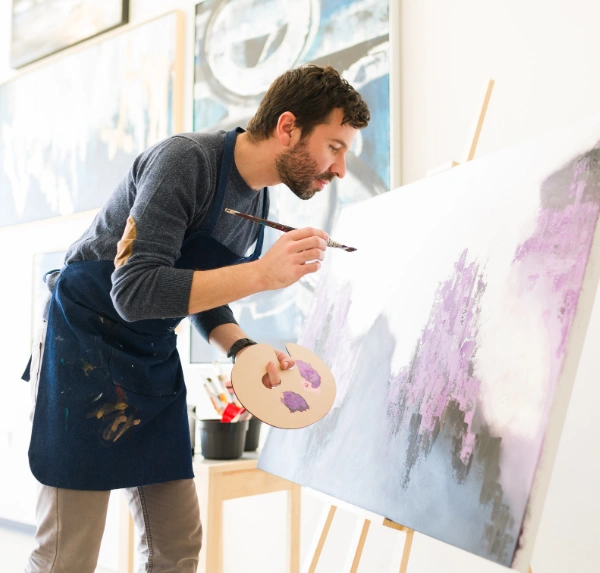Creating The Way to Recovery Through Therapeutic Art Activities
Are you skeptical about what traditional therapy can offer you?
While an important component of any addiction treatment program, there are other holistic therapies that can also help you learn to express yourself and your difficult feelings.
At Ingrained, art therapy for addiction recovery is an important piece of the treatment process.
We feel (and evidence backs this up) that art therapy in treatment helps by improving self-expression, reducing stress, and increasing self-esteem.
Not only is it helpful for addiction recovery, but it also aids in mental health issues like depression and anxiety. When administered in a group setting, it can improve interpersonal relationships.
Ingrained Recovery is proud to offer robust treatment programs using art therapy, music therapy, and more. When you’re with us, you get holistic care for your substance use and mental health issues.
Keep reading to learn more about the benefits of art therapy and why you should choose this treatment at our leading Georgia rehab campus.
Get Effective Treatment Programs at Ingrained Recovery

The Benefits of Art Therapy in Addiction Treatment
While nobody would dispute the power of a therapeutic relationship with a clinician while in recovery for substance use disorders, more holistic care is often overlooked.
Activities like art therapy can be crucial ways of finding new coping skills and new ways of expressing yourself.
What are some of the benefits of having art therapy programs at the treatment center you select for the early days of your sobriety?
Here are some of the key reasons why you should participate if art or music therapy is offered to you.
Improving Self-Expression with Substance Use Disorders
One of the struggles for many people with a substance abuse issue is that they don’t know how to truly tap into their feelings and expressions. They may not have the words to describe how they feel, which can make work in the therapy room that much more difficult.
Complex emotions lurk under the surface, but how can you get them out?
Art therapists are skilled at helping people learn new ways of communicating. Instead of using words, you might use color and line to express how you feel. Creative expression can be just as powerful as therapeutic intervention in more traditional treatment approaches.
Creating art can also take away some of the pressure to perform and share your deepest feelings with someone else who’s watching. This can be something just for you, for your loved ones, or you could decide to share your art-making in therapy as you learn and grow. Self-expression is a central part of art therapy.
Get Proven Detox and Rehab Options at Ingrained

Art Therapy Prompts Help with Substance Abuse Stress
Stress reduction is an important component of any treatment experience for a substance use disorder. One of the most common reasons cited for using substances is stress in day-to-day life. Art therapy for addiction recovery aims to give you an outlet for that stress while it reveals hidden aspects of you.
Think about it this way: You think you want to turn to the booze to cope with a long day at work. Most of the time, you already know that this is a bad idea but lack other coping skills to deal with it.
Art therapy and music therapy are two outlets that allow you to explore that stress in a productive way.
Next time you think that you want to pick up a prescription bottle or a liquor bottle, consider a pencil instead. You’ll have something positive to focus on from your art therapy sessions.
Improve Self-Esteem with Art and Music Therapy
Do you feel down on yourself because of your need for addiction treatment? Once people enter a rehab facility, they often feel that their self-esteem is at its absolute lowest. Their life feels unmanageable and requires extreme intervention to get to the bottom of it.
The good news is that self-esteem improves with creative expression. There are no right or wrong answers when you work on a piece of art, especially one that’s designed to communicate something about yourself to the world.
In one landmark study, participants who had access to art therapists for a 45-minute session filled out a survey both before and after their art-making. Almost three-quarters of the participants had higher scores of self-efficacy when the session was over. They felt equipped to cope with difficult feelings and situations, as well as more apt to successfully problem-solve.
Promoting self-efficacy and self-awareness, alongside offering effective art therapy worksheets and exercises, are important components of a successful and client-centered approach to art therapy.
Reduced Mental Health Issues with Art Therapy
If you have underlying trauma or depression, you may benefit more from the help of a skilled clinician trained by the American Art Therapy Association. Your art therapy sessions help you with an important component of cognitive functioning and emotional regulation.
One of the therapeutic benefits of the creative process is that it gets to the heart of trauma faster than traditional therapy in many cases. Studies show that art therapy for addiction can expedite the ability of a therapist to tap into the underlying reasons for substance use disorders.
Of course, it may not be enough to simply process trauma. Emotional responses to this and other life events can also spur feelings of intense depression and anxiety.
It anchors you in the present moment and makes it that much easier to manage symptoms of troubling mental health issues.
These coping skills can be useful for all sorts of unique interventions besides just addiction treatment and recovery. Once you’ve learned to harness art therapy prompts, you’ll be primed to deal with all other emotions in this beneficial way.
Provide Opportunities for Personal Growth on the Recovery Journey

Are you ever done with the process of self-discovery? Whether you came to rehab for addiction treatment or mental health, your inner thoughts play a huge role in how you feel and handle more difficult situations that arise. Art is a way for you to learn more about yourself.
It opens you up to the possibilities of what life could be like when you transition out of a program. Through art therapy, you learn how to manage symptoms on your own and harness that treatment experience for everyday situations.
As you grow into the person you want to be post-treatment, you’ll have new ways to deal with negative thoughts on your recovery journey. Get it all out in a sketchbook or on a canvas, or on our art therapy worksheets, now used by clinicians and treatment centers nationwide.
You will be able to see how your art grows and adapts as you practice sobriety for longer periods.
Improve Interpersonal Relationships in a Group Setting
While self-discovery and self-expression are important components of treatment, your well-being also leads to connections with peers on a deeper level. One of your recovery goals might be to improve the quality of your relationships with your loved ones, family, and friends in your everyday life.
Art therapy can help improve interpersonal relationships.
Art can be a non-verbal way to communicate with them, and you can practice this in group settings at a treatment center like Ingrained Recovery.
One of the benefits of art therapy is that it encourages you to start simply listening when others share their work with you. Art offers a non-threatening way to approach lasting recovery, akin to Twelve Step meetings and other coordinated efforts to connect with people for success (and enjoyment of life) in sobriety.
Why Look for Addiction Treatment with Art Therapy Programs?

Unfortunately, not all addiction treatment programs have recognized the important role that art plays in taking those first steps toward recovery.
Ingrained Recovery is proud to offer holistic treatments in our rehab experience so that you get the help you need when and where you need it most.
We offer not just art therapy. We also offer music therapy and yoga therapy for a truly comprehensive approach to help you get sober.
Creating art is not just a means of self-expression. It’s the catalyst to help you start talking about the things that have brought you to this point. Our approach to addiction recovery provides an array of unique programs that are all offered under our umbrella of care and are covered by insurance.
Take advantage of art therapy for addiction while you’re with us, and you’ll be equipped with a new set of skills to take home with you when you transition out of residential or inpatient care.
Get Support to Embrace the Art of Recovery at Ingrained
Are you ready to tap into the creative process, using art therapy prompts to get you thinking about the choices you made leading up to this moment?
Ingrained Recovery wants to be with you every step of the way as you learn to embrace sobriety. Start reducing stress and allow us to simply listen to what you need.
Our enrollment team is ready and waiting to answer your questions about our programs. We can even verify your insurance benefits in a quick and confidential phone call that doesn’t obligate you to our treatment experience.
Call today to reserve a spot in our holistic and comprehensive rehab program and start tapping into some of these sensory experiences and therapeutic benefits today!
Up To 100% of Rehab Costs Covered By Insurance
References
- Haeyen, S., & Noorthoorn, E. (2021). Validity of the Self-Expression and Emotion Regulation in Art Therapy Scale (SERATS). PloS one, 16(3), e0248315.
- Martin, L., Oepen, R., Bauer, K., Nottensteiner, A., Mergheim, K., Gruber, H., & Koch, S. C. (2018). Creative Arts Interventions for Stress Management and Prevention-A Systematic Review. Behavioral sciences (Basel, Switzerland), 8(2), 28.
- Kaimal, G., & Ray, K. (2016). Free art-making in an art therapy open studio: changes in affect and self-efficacy. Arts & Health, 9(2), 154–166.
- Quinn P. (2025). Art therapy’s engagement of brain networks for enduring recovery from addiction. Frontiers in psychiatry, 15, 1458063.
- Shukla, A., Choudhari, S. G., Gaidhane, A. M., & Quazi Syed, Z. (2022). Role of Art Therapy in the Promotion of Mental Health: A Critical Review. Cureus, 14(8), e28026.
- Hu, J., Zhang, J., Hu, L., Yu, H., & Xu, J. (2021). Art Therapy: A Complementary Treatment for Mental Disorders. Frontiers in psychology, 12, 686005.
